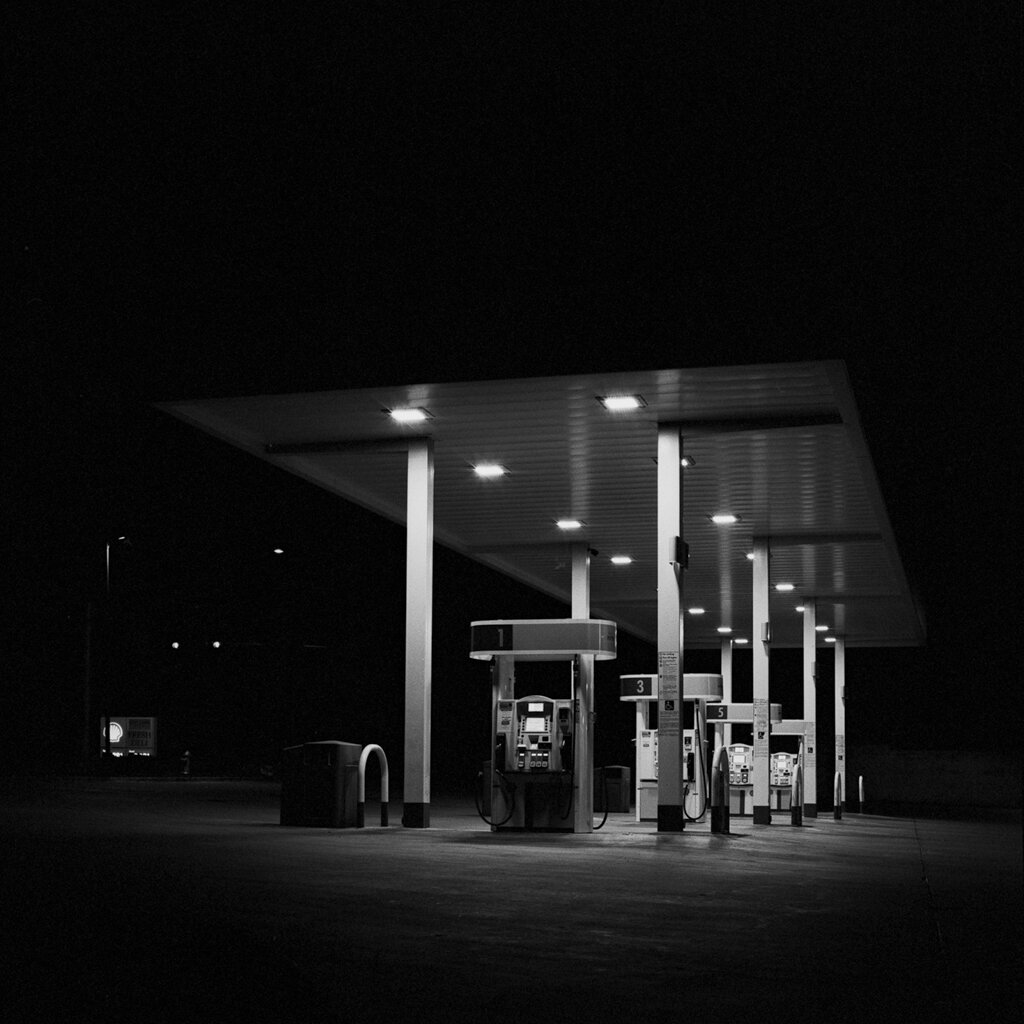47 Nearby Gasoline Stations
Climate change will force humans to cut their dependency on fossil fuels or the consequences will be catastrophic. But how can we really grasp and put our consumption of oil into a relatable context? Numbers as such millions of oil barrels produced per year don’t seem to make sense to anyone outside of the oil industry. This project aims at making sense of gasoline consumption from a local standpoint.
If we travel back a tiny distance in the history of the human race, oil and its favorite derivative, gasoline were nowhere to be seen, not even imagined. The invention of steam power (powered by oil’s sibling fossil fuel, coal) defined the start of the industrial age. But the widespread use of this convenient black liquid really hit the accelerator and drove us into the modern age. Fueled by oil products, the twentieth century saw a pace of ever-increasing technological gains that could hardly be imagined by earlier generations. The widespread success of oil can make it easy to forget that that pace of things would never have happened without this energy source that is now so commonly dispensed on so many street corners.
On the downside, the climate-shifting potential of this energy boon has been studied long before its widespread adoption. By 1896, Svante Arrheius, a Swedish scientist, understood CO2’s heating properties. He wondered when the effects of carbon dioxide would affect our planet’s climate. For context, remember that the Ford Model T debuted twelve years later, in 1908.
By the time of this writing, the oil industry has succeeded in providing consumers with an apparently wide array of choices, Exxon or Texaco, Shell or Total, Unleaded or Premium, and of course all the various exciting engine-cleaning additives. Until the 1970’s these choices also included leaded gasoline with all the damage it brought.
Long forgotten are the common streetcar systems in major American cities that were purchased by these same corporations only to be scrapped. Recently it has come out that these same industries did their own studies of climate change, which they subsequently suppressed, all this starting decades ago.
How can we take a measure of this global oil industry in a way that brings it down somewhat to a human scale? Let’s take a look at an arbitrary five-mile radius (a walkable distance). Living in the capital city of Texas, the center of the circle is within close proximity of the lovely Lady Bird Wildflower Center. How many gas stations can be found within these 78.5 square miles? At the current count, we have 47 active filling stations with another three on the way, all delivering to the consumer a powerful fuel that causes so much damage to the climate of our planet and to Life itself.
In 2021 alone, the North-West of the US and Western Canada experienced an unprecedented heatwave bringing temperatures of 116F/46.6C to Portland (Oregon) and 104F/40C reported in British Colombia, Canada, a region that many thought would be spared by climate change. These temperatures are completely out of normal range, glaciers are melting very fast.
Catastrophic flooding hit several European countries and for the first time on record, rain, not snow, fell in Greenland. Many other examples are in the news on a daily basis, showing that extreme weather has become the new normal now, and is happening around the World.
In 1976, Juan Carlos Pérez Alfonzo (Venezuela’s minister of mines and hydrocarbons 1959-1964) stated:
“Ten years from now, twenty years from now, you will see, oil will bring us ruin… It is the devil’s excrement”.
Clinging to oil will not lead us anywhere. We humans must break our dependence on oil and its impact on public health, climate, biodiversity, and wellbeing of many people. The solutions lie ahead of us: diversifying our sources of energy, redefining mobility, transforming cities, societies, and economies for sustainability are our most important duties.
With vision, commitment and creativity, we can take on this huge challenge and instead evolve and improve our way of life, to leave a smaller footprint behind us. Humans of today must succeed for the future generations of all living forms, as we know Earth is unique.
A version of this article appeared on emulsive.org
1 - Brodie and Davis
2- TX 290 and William Cannon
3 - Escarpment and William Cannon
4 - West Gate and Stassney
5- Manchaca and Berkeley
6 - Brodie Lane and Harper's Ferry
7 - Manchaca and Regal Row
8 - Manchaca and Ravenscroft
9 - Manchaca and Matthews
10 - Slaughter and West Gate
11 - William Cannon and Deatonhill
12 - William Cannon and Brush Country
13 - Brodie and FM 1626
14 - Manchaca and Casa Garcias
15 - Slaughter and Brodie
16 - Manchaca and Jones
17 - Manchaca and Monarch
18 - SH45 and FM 1826
19 - Nutty Brown and FM 1826
20 - TX 290 and Oakclare
21 - Slaughter and MoPac/Loop 1
22 - William Cannon and Brush Country
23 - TX 71 near National Elite Gymnastics
24 - South 1st and William Cannon
25, 26, 27 - South 1st and Dittmar
28 - South 1st and FM 1626
29 - TX 71 and Fletcher
30, 31 - Brodie and William Cannon
32 - Manchaca and Slaughter
33 - Manchaca and Slaughter
34 - South 1st and William Cannon
35 - Davis and West Gate
36 - William Cannon and Woodhue
37 - South Congress and Slaughter
38 - Monterrey and TX 290
39 - Fletcher and TX 71
40, 41 - Davis and Manchaca
42 - TX 71 near the Y
43 - Brodie and Dunliegh
44 - South Congress and Slaughter
45 - South 1st and Slaughter
46 - South 1st and Slaughter
47 - Monterrey and TX 290
A - South 1st and FM 1626
B - Manchaca and Bichon Bend
C - South Congress and Slaughter

Geographical distribution of gas stations -- Map: OpenStreetMap, © OpenStreetMap contributors













































